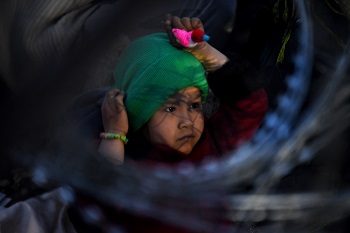One year on after EU-Turkey statement the human cost to refugee and migrant children mounts up
One year after the Balkan border closures and the EU-Turkey Statement which were aimed at stopping mass migration flows, refugee and migrant children face greater risks of deportation, detention, exploitation and deprivation, says UNICEF.

On 22 February 2016, a small child stands behind a fence near a refugee transit camp for refugees and migrants in Idomeni. As border changes in the Balkan region create confusion and chaos, hundreds of refugees from Afghanistan and Iraq returned to Greece.
“While there has been a major decrease in the overall numbers of children on the move into Europe since last March, there has been an increase in the threats and distress refugee and migrant children endure,” said Afshan Khan UNICEF Regional Director and Special Coordinator for the Refugee and Migrant Crisis in Europe. “It has become a vicious circle - children flee suffering, and they end up either fleeing again, or facing de facto detention, or just utter neglect.”
UNICEF staff in Greece report deep levels of distress and frustration among children and their families, including one child as young as eight attempting self-harm. Despite recent improvement in living conditions some unaccompanied children in shelters, suffer psychosocial distress, with high levels of anxiety, aggression and violence and demonstrating high risk behaviour such as drugs and prostitution. War, destruction, the death of loved ones and a dangerous journey exacerbated by poor living conditions in camps around Greece or the lengthy registration and asylum procedures, can trigger post-traumatic stress disorders.
Hawar, 14 years old from Iraqi, said: “Sometimes it’s good and sometimes it’s bad. Some days I am motivated and some days I am emotionally exhausted. I feel trapped. I do not want to see anyone or anything from the camp. After I go out for a while, I usually feel better.”
A father of four from Afghanistan, Maroof, says the experience of crossing the Eastern Mediterranean have had negative psychological effects on him, his wife and the children, for which they have not received counselling. “My children’s behaviour has changed since coming here. They don’t want to go to school and they fight. Today, for example, I sent them to school in the camp and they walked out of the class. We are not sure about anything. We are trapped on an island and this is causing psychological problems. My only happiness is that we are alive.”
UNICEF, in collaboration with the Greek government and NGO partners, are prioritising appropriate care for refugee and migrant children to meet their mental health and psychosocial needs. Imminent transfers back to Greece in line with so-called Dublin regulations, are likely to add even greater strain to the situation facing children and further pressure to existing services.
Instead of stemming the flow, border closures and the EU-Turkey statement, have led to children and families taking matters into their own hands and embarking on even more dangerous and irregular routes with smugglers, as UNICEF and partners warned a year ago. Even in 2017 nearly 3,000 refugees and migrants – with about a third children – have arrived in Greece despite the full implementation of the EU-Turkey Statement and strict border control. Many continue to slip through borders into Bulgaria, West Balkans and Hungary.
Children stranded in Greece and West Balkans have already lost nearly three years of education and now face several hurdles like different languages and education systems and yet another year without schooling. UNICEF is supporting the Ministry of Education’s strategy to integrate stranded refugee and migrant children in Greek schools. However only 2,500 children out the 15,000 school age children so far that benefit from the national scheme in Greek language.
Despite significant efforts – from government and partners - about half of the 2,100 unaccompanied children are still living in substandard conditions, including nearly 200 unaccompanied children in facilities with limited movement early March (178 in reception and identification centres on the Islands and 16 in “protective custody” in police cells)
Source:United Nations Children's Fund
- 258 reads
Human Rights
Fostering a More Humane World: The 28th Eurasian Economic Summi

Conscience, Hope, and Action: Keys to Global Peace and Sustainability

Ringing FOWPAL’s Peace Bell for the World:Nobel Peace Prize Laureates’ Visions and Actions

Protecting the World’s Cultural Diversity for a Sustainable Future

Puppet Show I International Friendship Day 2020

